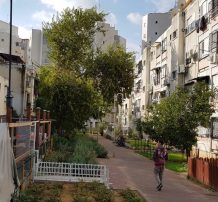Urban Renewal, Rishon Letzion

The project in the Ramat Eliyahu neighborhood of Rishon Letzion is a large-scale construction and demolition project that ultimately, in twenty years, is expected to change the neighborhood entirely: the neighborhood’s population will almost double, and instead of the 4,300 housing units that exist today, there will be 7,200 apartments, most of the old neighborhoods will be demolished, and in their place new buildings and towers will be built (raze-and-rebuild), new public buildings will be built, roads will be renovated and expanded, gardens will be developed, new stores will be opened, many residents will leave and new residents will come to take their place. About half of the residents will receive a new apartment outside of the neighborhood, in one of the new neighborhoods.
The renewal of Ramat Eliyahu depends on the establishment of four new neighborhoods in Rishon Letzion — West Nahalat Yehuda, Nahalat Yehuda Illit, Tsrifin, and Complex A. The first new apartments that will be built for residents of Ramat Eliyahu will be in these additional neighborhoods, and not in Ramat Eliyahu itself. Only after the first buildings are built in the new neighborhoods will some of the residents of Ramat Eliyahu (those who have chosen to live in one of the neighborhoods) leave for good. When the old local residents leave for the new neighborhood, their former buildings will be demolished, and the vacant lots where the demolitions took place will be replaced with new buildings, higher than any that exist in the neighborhood today. New renters will enter the new buildings, some of them current residents of Ramat Eliyahu who chose to remain, and some new residents who will come from all over the country.
The build-raze-rebuild project is an initiative of the Rishon Letzion Municipality, and is managed and promoted by the raze-and-rebuild management of Rishon Letzion. The management participates in planning the neighborhood, oversees the planning of the supplementary neighborhoods being built, and assists the residents in choosing the neighborhood they will live in in the future.
Through the Coalition for Social Justice in Urban Renewal, founded by Bimkom together with partner organizations, several meetings were held between the raze-and-rebuilt management of Ramat Eliyahu and various officials in the Ministry of Housing and the Authority for Urban Renewal, for the purpose of improving the bureaucratic action such that fewer residents will be negatively impacted from the urban renewal process.
Summary:
As part of the Social Justice Coalition for Urban Renewal, we worked in the Ramat Eliyahu neighborhood of Rishon Letzion in order to deepen our understanding of the way urban renewal projects in general, and in Ramat Eliyahu in particular, are conducted, identifying their failures and aiming to rectify them. We conducted social mapping in one of the complexes that had been designated for eviction, and maintained extensive communication with the neighborhood administration.
The project in the Ramat Eliyahu neighborhood of Rishon Letzion is a large-scale construction and demolition project that ultimately, in twenty years, is expected to change the neighborhood entirely: the neighborhood’s population will almost double, and instead of the 4,300 housing units that exist today, there will be 7,200 apartments, most of the old neighborhoods will be demolished, and in their place new buildings and towers will be built (raze-and-rebuild), new public buildings will be built, roads will be renovated and expanded, gardens will be developed, new stores will be opened, many residents will leave and new residents will come to take their place. About half of the residents will receive a new apartment outside of the neighborhood, in one of the new neighborhoods.
The renewal of Ramat Eliyahu depends on the establishment of four new neighborhoods in Rishon Letzion — West Nahalat Yehuda, Nahalat Yehuda Illit, Tsrifin, and Complex A. The first new apartments that will be built for residents of Ramat Eliyahu will be in these additional neighborhoods, and not in Ramat Eliyahu itself. Only after the first buildings are built in the new neighborhoods will some of the residents of Ramat Eliyahu (those who have chosen to live in one of the neighborhoods) leave for good. When the old local residents leave for the new neighborhood, their former buildings will be demolished, and the vacant lots where the demolitions took place will be replaced with new buildings, higher than any that exist in the neighborhood today. New renters will enter the new buildings, some of them current residents of Ramat Eliyahu who chose to remain, and some new residents who will come from all over the country.
The build-raze-rebuild project is an initiative of the Rishon Letzion Municipality, and is managed and promoted by the raze-and-rebuild management of Rishon Letzion. The management participates in planning the neighborhood, oversees the planning of the supplementary neighborhoods being built, and assists the residents in choosing the neighborhood they will live in in the future.
Through the Coalition for Social Justice in Urban Renewal, founded by Bimkom together with partner organizations, several meetings were held between the raze-and-rebuilt management of Ramat Eliyahu and various officials in the Ministry of Housing and the Authority for Urban Renewal, for the purpose of improving the bureaucratic action such that fewer residents will be negatively impacted from the urban renewal process.
Summary:
As part of the Social Justice Coalition for Urban Renewal, we worked in the Ramat Eliyahu neighborhood of Rishon Letzion in order to deepen our understanding of the way urban renewal projects in general, and in Ramat Eliyahu in particular, are conducted, identifying their failures and aiming to rectify them. We conducted social mapping in one of the complexes that had been designated for eviction, and maintained extensive communication with the neighborhood administration.
